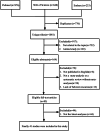Milk consumption and multiple health outcomes: umbrella review of systematic reviews and meta-analyses in humans
- PMID: 33413488
- PMCID: PMC7789627
- DOI: 10.1186/s12986-020-00527-y
Milk consumption and multiple health outcomes: umbrella review of systematic reviews and meta-analyses in humans
Abstract
In order to recapitulate the best available evidence of milk consumption and multiple health-related outcomes, we performed an umbrella review of meta-analyses and systematic reviews in humans. Totally, 41 meta-analyses with 45 unique health outcomes were included. Milk consumption was more often related to benefits than harm to a sequence of health-related outcomes. Dose-response analyses indicated that an increment of 200 ml (approximately 1 cup) milk intake per day was associated with a lower risk of cardiovascular disease, stroke, hypertension, colorectal cancer, metabolic syndrome, obesity and osteoporosis. Beneficial associations were also found for type 2 diabetes mellitus and Alzheimer's disease. Conversely, milk intake might be associated with higher risk of prostate cancer, Parkinson's disease, acne and Fe-deficiency anaemia in infancy. Potential allergy or lactose intolerance need for caution. Milk consumption does more good than harm for human health in this umbrella review. Our results support milk consumption as part of a healthy diet. More well-designed randomized controlled trials are warranted.
Keywords: Health; Meta-analysis; Milk; Systematic review; Umbrella review.
Conflict of interest statement
The authors declare that they have no competing interests.
Figures
References
-
- Evershed RP, Payne S, Sherratt AG, Copley MS, Coolidge J, Urem-Kotsu D, et al. Earliest date for milk use in the near east and southeastern Europe linked to cattle herding. Nature. 2008;455:528–531. - PubMed
-
- Dudd SN, Evershed RP. Direct demonstration of milk as an element of archaeological economies. Science. 1998;282:1478–1481. - PubMed
-
- World Health Organization. Global and regional food consumption patterns and trends. 2018. http://www.who.int/nutrition/topics/3_foodconsumption/en/index4.html.
-
- Bouglé D, Bouhallab S. Dietary bioactive peptides: human studies. Crit Rev Food Sci Nutr. 2017;57:335–343. - PubMed
Publication types
Grants and funding
LinkOut - more resources
Full Text Sources
Other Literature Sources



